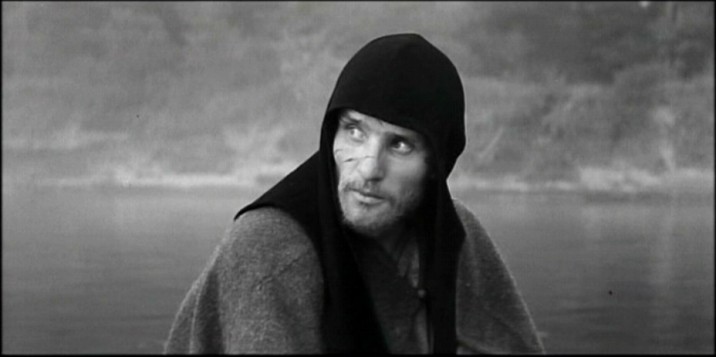 08-01-2008, 08:10 PM
08-01-2008, 08:10 PM
|
#1211 (permalink)
|
|
Groupie
Join Date: Jul 2008
Posts: 29
|

The last film I watched was Andrei Rublev (1966)

Andrei Rublev opens with an thematically related prologue, though unrelated plotwise to the remainder of the film. Yefim, a peasant searching for a means to physically release himself from the confines of the barren Russian landscape, takes flight in a patchy air balloon. His bliss at being airborne is quickly transformed into panic however, as his vehicle hurls towards the ground. Yefim and his aspirations are crushed by the austere terrain. This breif segment introduces a central theme; the artist's struggle again those forces, both natural and human, that seek to inhibit artistic freedom. As the following vignettes introduce us to Andrei Rublev and the major events shaping his life, this theme becomes more defined. As an artist, Rublev must draw inspiration from the most feral circumstances.
Throughout the film we are introduced to many characters representing the hopeful, the creative, and the visionary. Yefim's hopes are crushed by the ground, the Jester's and Marfa's by a group of brutal soldiers. Not until the final vignette do we see the triumph of the artistic spirit over the tyrannic and brutish. The Grand Prince commissions the casting of a bell, but the town's bellmaker has died. The bellmaker's son, Boriska--our final creative character, insists that his father has passed to him the secrets of bellmaking . Boriska begins the arduous task of casting the bell, relishing in his control over the workers but laboring to cast the bell correctly against the punishment of death. Rublev witnesses the event from the peripherary and from a self-imposed vow of silence. The bell rings beautifully at the inauguration ceremony and Boriska collapses to the ground in tears. As Rublev embraces him, Boriska reveals that his father did not pass down the secrets of bellmaking. Boriska's unwavering faith in his own skill was soley responsible for the bell. The beauty of this moment inspires Andrei to break his vow of silence and resume his art.
The final moments of the bell-casting sequence represent not only the triumph of Boriska over the Grand Prince but also the triumph of Rublev over all of the events and persons throughout the film that have led him to doubt himself and his abilities. His encounter with the pagans and tempation for the naked pagan woman, his slaying of a Tatar to save the life of a mute woman, and his abandonment by that woman led Andrei to give up painting. Boriska's supreme achievement restores Rublev's faith. Rublev's ability to overcome the adversity present in medievil Russia is evident by the survival of his greatest icons, which the camera glides over in the film's epilogue.
-lesamourai
Last edited by lesamourai; 08-01-2008 at 08:22 PM.
|

|

|